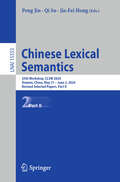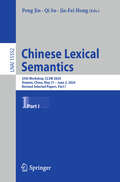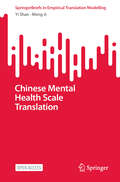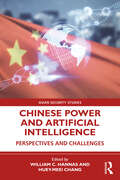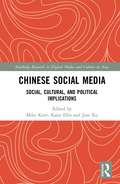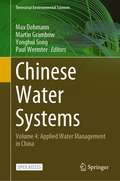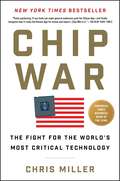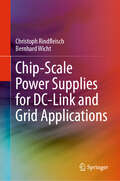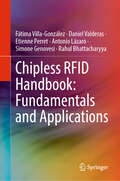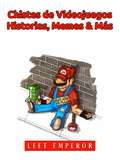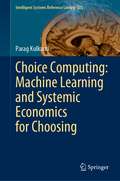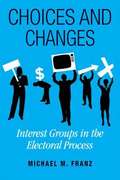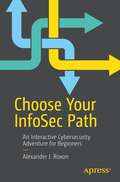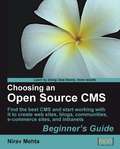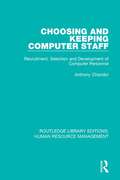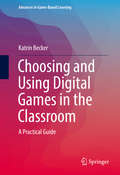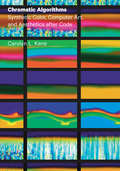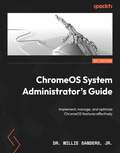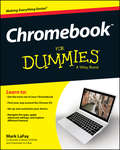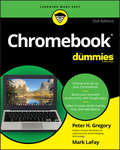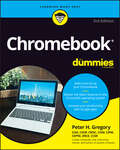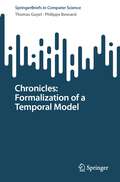- Table View
- List View
Chinese Lexical Semantics: 25th Workshop, CLSW 2024, Xiamen, China, May 31 – June 2, 2024, Revised Selected Papers, Part II (Lecture Notes in Computer Science #15553)
by Jia-Fei Hong Qi Su Peng JinThe two-volume set LNAI 15552 and 15553 constitutes the refereed post-conference proceedings of the 25th Workshop on Chinese Lexical Semantics, CLSW 2024, held in Xiamen, China, during May 31–June 2, 2024. The 64 revised full papers presented in these proceedings were carefully reviewed and selected from 226 submissions. The papers are organized in the following topical sections: Part I : Lexical Semantics Part II : Computational Linguistics and Natural Language Processing; Corpus Linguistics and Language Resources; and General Linguistics.
Chinese Lexical Semantics: 25th Workshop, CLSW 2024, Xiamen, China, May 31–June 2, 2024, Revised Selected Papers, Part I (Lecture Notes in Computer Science #15552)
by Jia-Fei Hong Qi Su Peng JinThe two-volume set LNAI 15552 and 15553 constitutes the refereed post-conference proceedings of the 25th Workshop on Chinese Lexical Semantics, CLSW 2024, held in Xiamen, China, during May 31–June 2, 2024. The 64 revised full papers presented in these proceedings were carefully reviewed and selected from 226 submissions. The papers are organized in the following topical sections: Part I : Lexical Semantics Part II : Computational Linguistics and Natural Language Processing; Corpus Linguistics and Language Resources; and General Linguistics.
Chinese Mental Health Scale Translation (New Frontiers in Translation Studies)
by Meng Ji Yi ShanThis open access book illustrates the key steps and procedures of developing mental health scales into linguistically and culturally appropriate translations. Through illustrative case studies, we demonstrate that traditional forward and backward translation have significant methodological limitations when applied in mental health scale translation, such as linguistic and cultural inaccessibility and inaccuracy in the clinic. Our book will stimulate more academic debates and further systematic research into the significant, interdisciplinary area of mental health translation, which has been underexplored in Translation Studies.
Chinese Power and Artificial Intelligence: Perspectives and Challenges (Asian Security Studies)
by William C. HannasThis book provides a comprehensive account of Chinese AI in its various facets, based on primary Chinese-language sources. China’s rise as an AI power is an event of importance to the world and a potential challenge to liberal democracies. Filling a gap in the literature, this volume is fully documented, data-driven, and presented in a scholarly format suitable for citation and for supporting downstream research, while also remaining accessible to laypersons. It brings together 15 recognized international experts to present a full treatment of Chinese artificial intelligence. The volume contains chapters on state, commercial, and foreign sources of China’s AI power; China’s AI talent, scholarship, and global standing; the impact of AI on China’s development of cutting-edge disciplines; China’s use of AI in military, cyber, and surveillance applications; AI safety, threat mitigation, and the technology’s likely trajectory. The book ends with recommendations drawn from the authors’ interactions with policymakers and specialists worldwide, aimed at encouraging AI’s healthy development in China and preparing the rest of the world to engage with it. This book will be of much interest to students of Chinese politics, science and technology studies, security studies and international relations.
Chinese Social Media: Social, Cultural, and Political Implications (Routledge Research in Digital Media and Culture in Asia)
by Katie Ellis Mike Kent Jian XuThis book brings together scholars from a variety of disciplines to address critical perspectives on Chinese language social media, internationalizing the state of social media studies beyond the Anglophone paradigm. The collection focuses on the intersections between Chinese language social media and disability, celebrity, sexuality, interpersonal communication, charity, diaspora, public health, political activism and non-governmental organisations (NGOs). The book is not only rich in its theoretical perspectives but also in its methodologies. Contributors use both qualitative and quantitative methods to study Chinese social media and its social–cultural–political implications, such as case studies, in-depth interviews, participatory observations, discourse analysis, content analysis and data mining.
Chinese Water Systems: Volume 4: Applied Water Management in China (Terrestrial Environmental Sciences)
by Martin Grambow Yonghui Song Max Dohmann Paul WermterThis open-access book addresses latest Sino-German results of the joint research efforts within Major Water Program of the Chinese Government supported by German research funding. The Major Water Program aims at the restoration of polluted water environments and sustainable management of water resources in China. The joint BMBF-CLIENT project SINOWATER deals with three most significant and strongest polluted Chinese waters, the river Liao and the Dian-lake as well as Tai-lake in the area of the metropolises Shenyang, Kunming and Suzhou, respectively. The project was conducted by the Research Institute for Water and Waste Management at RWTH Aachen (FiW) e.V., Bavarian State Ministry of the Environment and Consumer Protection, Technical University of Munich, RWTH Aachen University, German and Chinese companies (Martin Membrane Systems AG, Steinhardt GmbH Wassertechnik, GuHong, JT-elektronik, bluemetric, Huawang Water, EVU Group, Atemis GmbH, i+f process GmbH) in close cooperation with Chinese Academy of Environmental Sciences, Tongji University, and the Dianchi Lake Management Authorities. Overall, the joint Sino-German research project SINOWATER provided solutions for the improvement of the water quality in the mentioned water bodies as well as development and optimization of Good Water Governance. These objectives could be achieved through the implementation of innovative German water technologies and the optimization of water management elements in the fields of industrial and municipal wastewater treatment as well as river and shallow lake management.
Chip War: The Fight for the World's Most Critical Technology
by Chris MillerThe Financial Times Business Book of the Year, this epic account of the decades-long battle to control one of the world&’s most critical resources—microchip technology—with the United States and China increasingly in fierce competition is &“pulse quickening…a nonfiction thriller&” (The New York Times).You may be surprised to learn that microchips are the new oil—the scarce resource on which the modern world depends. Today, military, economic, and geopolitical power are built on a foundation of computer chips. Virtually everything—from missiles to microwaves—runs on chips, including cars, smartphones, the stock market, even the electric grid. Until recently, America designed and built the fastest chips and maintained its lead as the #1 superpower, but America&’s edge is in danger of slipping, undermined by players in Taiwan, Korea, and Europe taking over manufacturing. Now, as Chip War reveals, China, which spends more on chips than any other product, is pouring billions into a chip-building initiative to catch up to the US. At stake is America&’s military superiority and economic prosperity. Economic historian Chris Miller explains how the semiconductor came to play a critical role in modern life and how the US became dominant in chip design and manufacturing and applied this technology to military systems. America&’s victory in the Cold War and its global military dominance stems from its ability to harness computing power more effectively than any other power. Until recently, China had been catching up, aligning its chip-building ambitions with military modernization. Here, in this paperback edition of the book, the author has added intriguing new material focused on "America's Chip Comeback,&” which overviews the global consequences of the just passed CHIPS Act, the new export controls on China, and the effort to rally allies to better guard chip technology. Illuminating, timely, and fascinating, Chip War is &“an essential and engrossing landmark study&” (The Times, London).
Chip-Scale Power Supplies for DC-Link and Grid Applications
by Bernhard Wicht Christoph RindfleischThis book is a comprehensive single-source on the design of chip-scale high-voltage power supplies for low-power DC-link and grid applications. It is written in handbook style with systematic guidelines and includes implementation examples. The authors cover the full range, from technology fundamentals to circuit implementation details. The book includes guidelines for the application-specific selection of the converter topology, design guidelines for the inductive components, and a detailed description of low-power optimized control approaches and subcircuits. The authors also include guidelines for the selection and design of high-voltage on-chip power switches and for the reduction of parasitic effects such as capacitive losses.
Chipless RFID Handbook: Fundamentals and Applications
by Etienne Perret Antonio Lázaro Fátima Villa-González Daniel Valderas Simone Genovesi Rahul BhattacharyyaChipless radio frequency identification (RFID) technology has emerged as a cost-effective alternative to conventional automated identification systems like RFID, QR codes, and barcodes. Simultaneously, it enables a wide array of novel applications, including recycling, structural health monitoring, and food safety, among many others. In this handbook, the authors provide an in-depth exploration of the design, manufacturing, and implementation guidelines of chipless RFID systems, including information encoding in chipless tags, the design of radar-based ultra-wideband (UWB) readers and antennas, as well as dedicated signal processing in time- and frequency-domain. This book is not only a practical resource for understanding the core principles and capabilities of chipless RFID, but also a rich source of expert knowledge for those wishing to deepen their understanding or explore particular applications. With real-world examples and detailed guidelines, the Chipless RFID Handbook serves as both a beginner-friendly introduction and an advanced reference on this emerging technology.
Chistes de Videojuegos, Historias, Memes & Más
by Leet EmperorEsta guía te ayudará a apender a contar chistes sobre videojuegos. Por eso, esta guía se enfoca en formas y métodos naturales para ofrecer los mejores resultados y sin efectos secundarios. Este libro te enseñará lo siguiente: - chistes de videojuegos - memes de videojuegos - contar buenos chistes Si quieres aprender a contar chistes sobre videojuegos, este libro es para ti.
Choice Computing: Machine Learning and Systemic Economics for Choosing (Intelligent Systems Reference Library #225)
by Parag KulkarniThis book presents thoughts and pathways to build revolutionary machine learning models with the new paradigm of machine learning to adapt behaviorism. It focuses on two aspects – one focuses on architecting a choice process to lead users on the certain choice path while the second focuses on developing machine learning models based on choice paradigm. This book is divided in three parts where part one deals with human choice and choice architecting models with stories of choice architects. Second part closely studies human choosing models and deliberates on developing machine learning models based on the human choice paradigm. Third part takes you further to look at machine learning based choice architecture. The proposed pioneering choice-based paradigm for machine learning presented in the book will help readers to develop products – help readers to solve problems in a more humanish way and to negotiate with uncertainty in a more graceful but in an objective way. It will help to create unprecedented value for business and society. Further, it will unveil a new paradigm for modern intelligent businesses to embark on the new journey; the journey of transition from shackled feature rich and choice poor systems to feature flexible and choice rich natural behaviors.
Choices and Changes: Interest Groups in the Electoral Process
by Michael M. FranzChoices and Changes is the most comprehensive examination to date of the impact of interest groups on recent American electoral politics. Richly informed, theoretically and empirically, it is the first book to explain the emergence of aggressive interest group electioneering tactics in the mid-1990s--including "soft money" contributions, issue ads, and "527s" (IRS-classified political organizations). Michael Franz argues that changing political and legal contexts have clearly influenced the behavior of interest groups. To support his argument, he tracks in detail the evolution of campaign finance laws since the 1970s, examines all soft money contributions--nearly $1 billion in total--to parties by interest groups from 1991-2002, and analyzes political action committee (PAC) contributions to candidates and parties from 1983-2002. He also draws on his own interviews with campaign finance leaders. Based on this rigorous data analysis and a formidable knowledge of its subject, Choices and Changes substantially advances our understanding of the significance of interest groups in U. S. politics.
Choose It! Videogame Edition
by Welbeck Children's BooksThis book is full of fun, clever and extremely silly "Would You Rather" questions starring your favorite videogame characters and worlds. Some might make you think, and others might make you laugh. Either way, YOU supply the answer!Would you rather fight four Mario-sized Bowsers, or one Bowser-sized Mario? Would you rather sniff Sonic's stinky sneakers, or Tom Nook's underpants? Would you rather eat soup made of goombas, or a Koopa Trooper sandwich? Would you rather be an exploding Creeper, or a Pac-Man ghost? All these and many more gaming-related "Would You Rather" questions are inside, complete with fun illustrations, silly gaming jokes and a top selection of gaming facts!
Choose Your InfoSec Path: An Interactive Cybersecurity Adventure for Beginners
by Alexander J. RoxonCybersecurity is a pressing issue across industries, as well as increasingly important in people’s personal lives. Learning the basic fundamentals is essential in order for companies and individuals to thrive. Although much of the literature around this hot-button topic can seem impenetrable and convoluted to a new learner, Choose Your InfoSec Path is an informative, fun, interactive cybersecurity adventure that has been written specifically with beginners in mind. Step into the shoes of a Chief Information Security Officer (CISO) and find out what could possibly go wrong during a breach. Author Alexander J. Roxon weaves together essential InfoSec concepts with an exciting and fast-paced storyline to make the lessons relatable and easy to understand. Determine what steps your character takes next and affect the outcome of your path. Will you emerge from the breach unscathed? With over 50 different endings, you can explore the what-ifs and experience a new path each time. A supporting glossary makes this book a resource you can return to long after your story is completed. Crucially, the integrity of the cybersecurity concepts is maintained and all events are genuinely plausible from a technical perspective. The book includes commentary to examine key concepts and reflect on decisions. This book is for those who are interested in understanding what cybersecurity is about but without a high technical barrier of entry. Learn some of the basics of incident response, how to dampen the effects of a breach, and get the jump on the bad guys. Your journey starts now. What You’ll LearnUnderstand some of the basic concepts of incident response.Experience how a real-life incident can go from zero to chaos very rapidly.Find out how being proactive can significantly improve how information security breaches play out.Discover how to dampen the effects of a breach. Who This Book Is For This book is for those who are interested in understanding what cybersecurity is about but without a high technical barrier of entry. People who like to laugh as well as learn.
Choosing an Open Source CMS: Beginner's Guide
by Nirav MehtaThis is a practical guide that takes a task-centered approach. Each task is stepped through with detailed instructions. You will come across many step-by-step examples with plenty of screenshots and resources. This book provides all the support and guidance you need as you begin to work with CMSs. It even has additional tasks that you can carry out to build your skills further. Everything is oriented towards managing content with a CMS. This book is written for anyone who wants to start a web site and is looking for a good CMS. It is best suited for people who are selecting a CMS for their sites and people who will manage a CMS. Knowledge of web basics is certainly helpful, but not needed.
Choosing and Keeping Computer Staff: Recruitment, Selection and Development of Computer Personnel (Routledge Library Editions: Human Resource Management)
by Anthony ChandorThis clear and detailed analysis, first published in 1976, of recruitment methods, staff development techniques, staff motivation, and organisational structures will be valuable to data processing managers and personnel officers alike. Its practical flavour and real understanding will also be welcomed by general management. The guidelines and detailed checklists will help cut the direct costs of recruiting and the often astonishingly high indirect costs of rapid staff turnover.
Choosing and Using Digital Games in the Classroom: A Practical Guide (Advances in Game-Based Learning #1)
by Katrin BeckerThis book presents an in-depth overview of the uses of digital games in education, from K-12 up through post-secondary. Beginning with a look at the history of games in education and the context for digital games, this book guides readers through various methods of serious game implementation, including the Magic Bullet Model, which focuses on the player's point of view of the game experience. The book also includes methods of measuring the effects of games in education and guidance on creating digital game-based learning lesson plans.
Choreomata: Performance and Performativity after AI
by Roberto Alonso TrilloIs artificial intelligence (AI) becoming more and more expressive, or is human thought adopting more and more structures from computation? What does it mean to perform oneself through AI, or to construct one’s subjectivity through AI? How does AI continue to complicate what it means to have a body? Has the golden age of AI, especially with regards to creative applications, already ended? Choreomata: Performance and Performativity after AI is a book about performance and performativity, but more specifically, it is a book about the performance of artificiality and the performance of intelligence. Both humans and human-designed computational forces are thoroughly engaged in an entangled, mutual performance of AI. Choreomata spins up a latticework of interdisciplinary thought, pairing theoretical inquiry from philosophy, information theory, and computer science with practical case studies from visual art, dance, music, and social theory. Through cross-disciplinary proportions and a diverse roster of contributors, this book contains insights for computer scientists, social scientists, industry professionals, artists, and beyond.
Chrissa
by Mary CasanovaChrissa Maxwell moves to a new school in the middle of the year, and the girls in her fourth-grade class are decidedly unfriendly. On the advice of her grandmother, Chrissa tries first to be nice, and then to ignore the mean girls. But they just won't quit, and when the teasing turns into serious bullying, Chrissa must find the courage to stand strong and speak out.
Chromatic Algorithms: Synthetic Color, Computer Art, and Aesthetics after Code
by Carolyn L. KaneThese days, we take for granted that our computer screens--and even our phones--will show us images in vibrant full color. Digital color is a fundamental part of how we use our devices, but we never give a thought to how it is produced or how it came about. Chromatic Algorithms reveals the fascinating history behind digital color, tracing it from the work of a few brilliant computer scientists and experimentally minded artists in the late 1960s and early '70s through to its appearance in commercial software in the early 1990s. Mixing philosophy of technology, aesthetics, and media analysis, Carolyn Kane shows how revolutionary the earliest computer-generated colors were--built with the massive postwar number-crunching machines, these first examples of "computer art” were so fantastic that artists and computer scientists regarded them as psychedelic, even revolutionary, harbingers of a better future for humans and machines. But, Kane shows, the explosive growth of personal computing and its accompanying need for off-the-shelf software led to standardization and the gradual closing of the experimental field in which computer artists had thrived. Even so, the gap between the bright, bold presence of color onscreen and the increasing abstraction of its underlying code continues to lure artists and designers from a wide range of fields, and Kane draws on their work to pose fascinating questions about the relationships among art, code, science, and media in the twenty-first century.
ChromeOS System Administrator's Guide: Implement, manage, and optimize ChromeOS features effectively
by Dr. Willie SandersExplore the sysadmin features and architecture of ChromeOS to master its local and cloud-based administrative tools and capabilitiesKey FeaturesGet a complete overview of using ChromeOS as a powerful system admin toolGet hands-on experience working with Google's administration platformLearn about centralized management of resources as the hallmark of enterprise system administrationBook DescriptionGoogle's ChromeOS provides a great platform for technicians, system administrators, developers, and casual users alike, providing a seemingly simplistic architecture that is easy enough for a novice user to begin working with. However, beneath the surface, this operating system boasts a plethora of powerful tools, able to rival any other OS on the market. So, learning how to harness the full potential of the OS is critical for you as a technical worker and user to thrive at your workplace. ChromeOS System Administrator's Guide will help you reap the benefits of all features of ChromeOS.This book explains ChromeOS' unique architecture and its built-in tools that perform essential tasks such as managing user accounts, working with data, and launching applications. As you build your foundational knowledge of the OS, you'll be exposed to higher-level concepts such as security, command line, and enterprise management.By the end of this book, you'll be well-equipped to perform a range of system administration tasks within ChromeOS without requiring an alternative operating system, thereby broadening your options as a technician, system administrator, developer, or engineer.What you will learnInstall, update, and configure ChromeOS on standalone devicesManage Google's cloud-based applications and resources effectivelyImplement key networking and security features to protect your architecture from cyber threatsUnderstand common troubleshooting and disaster recovery techniquesMigrate data from other platforms to Google Workspace efficientlyPerform administrative tasks and run Linux scripts with Chrome ShellManage your enterprise from the Google Workspace Admin ConsoleWho this book is forThis book is for you if you want to become a system administrator, developer, or engineer, and are looking to explore ChromeOS architecture all while expanding your knowledge of administration tools and techniques. Basic knowledge of system administration is required.
Chromebook For Dummies
by Mark LafayGet the most out of your Google ChromebookAre you the proud new owner of a Google Chromebook and a little--or a lot--intimidated by the technology? You've come to the right place! Chromebook For Dummies walks you through setting up the device, transitioning from traditional computers and working in the cloud, customizing Chromebook to suit your needs, navigating the apps and their uses, and applying advanced settings and features. Fear not: with the step-by-step guidance and helpful information inside, there's no reason to break a sweat.Chromebooks are affordable, fast, and sleek--and with Google driving the initiative, they're impossible to ignore. So it's no wonder they're gaining popularity and enticing people from all walks of life to make the switch from a traditional PC or laptop. If you're one of those people and want to make the most of your experience, this book is a practical user's guide to all things Chromebook.Covers all Chromebooks on the marketProvides coverage of all Chromebook features in an easy-to-follow mannerServes as the go-to reference for successfully using a ChromebookIncludes step-by-step coverage of everything you'll encounter with your ChromebookIf you're a new or inexperienced user who wants to maximize the performance of your Google Chromebook, you'll turn to this friendly guide time and again.
Chromebook For Dummies
by Peter H. GregoryGet the most out of your Google Chromebook Chromebook For Dummies walks you through setting up your Chromebook, transitioning from traditional computers, customizing a Chromebook to fit your needs, navigating the many apps and their uses, and applying advanced settings and features. This book documents the features of all Chromebooks, approaching them from the point of view of a smart person who is intimidated by the technology. Offers extensive and practical information Covers all portable computers powered by Chrome OS Helps make it easy to drive these fast, user-friendly devices Includes coverage of the latest features in the Chrome operating system You’ll end up keeping this book close at hand, referring to it often as you explore the features of your Chromebook.
Chromebook For Dummies
by Peter H. GregoryThe return of the bestselling Chromebook guide on the market Chromebook For Dummies, Third Edition, is your easy-to-follow guide to the low-cost alternative to a traditional laptop. This beginner’s manual walks you through setting up your Chromebook, transitioning from using a traditional computer, and customizing the system to fit your needs. In case you’re wondering, the Chromebook can be used for anything you'd normally do online—checking email, browsing websites, watching videos. This book takes you through all of it, giving you the latest updates on new Chromebook hardware and software features. Navigate apps, apply advanced settings and features, and turn to this guide time and again as you customize and optimize your Chromebook’s performance. Get all the basics on using your Chromebook, in easy-to-follow Dummies style Set up and start using your Chromebook with ease Learn about the latest features in the Chrome operating system Discover the benefits of Chromebook versus traditional laptopsNew and novice Chromebook users will love this approachable intro to Google’s little portable computer.
Chronicles: Formalization of a Temporal Model (SpringerBriefs in Computer Science)
by Thomas Guyet Philippe BesnardThis book is intended as an introduction to a versatile model for temporal data. It exhibits an original lattice structure on the space of chronicles and proposes new counting approach for multiple occurrences of chronicle occurrences. This book also proposes a new approach for frequent temporal pattern mining using pattern structures. This book was initiated by the work of Ch. Dousson in the 1990’s. At that time, the prominent format was Temporal Constraint Networks for which the article by Richter, Meiri and Pearl is seminal. Chronicles do not conflict with temporal constraint networks, they are closely related. Not only do they share a similar graphical representation, they also have in common a notion of constraints in the timed succession of events. However, chronicles are definitely oriented towards fairly specific tasks in handling temporal data, by making explicit certain aspects of temporal data such as repetitions of an event. The notion of chronicle has been applied both for situation recognition and temporal sequence abstraction. The first challenge benefits from the simple but expressive formalism to specify temporal behavior to match in a temporal sequence. The second challenge aims to abstract a collection of sequences by chronicles with the objective to extract characteristic behaviors. This book targets researchers and students in computer science (from logic to data science). Engineers who would like to develop algorithms based on temporal models will also find this book useful.
